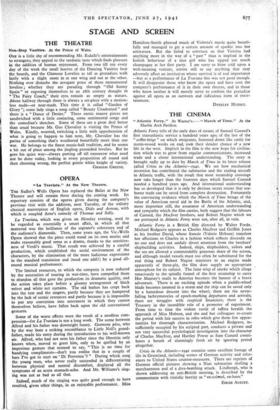THE CINEMA
" Atlantic Ferry." At Warner's. " March of Time." At the Marble Arch Pavilion.
Atlantic Ferry tells of the early days of steam; of Samuel Cunard's first transatlantic service a hundred years ago; of the last of the " coffin-brigs " on which emigrants, battened down like cattle for storm-tossed weeks on end, took their slender chance of a new life in the west. Implicit in the film is the new hope for civilisa- tion which was to grow from regular communications, increased trade and a closer international understanding. The story is brought sadly up to date by March of Time in its latest release called Crisis in the Atlantic-1941. We see how mechanical invention has contributed the submarine and the raiding aircraft to Atlantic traffic, with the result that most steamship crossings now take longer than the fourteen days which Samuel Cunard needed a hundred years ago. And international understanding has so developed that it is only by devious secret routes that sea- borne trade can be saved from complete destruction. Fortunately the convincing evidence which the March of Time brings of the value of American naval aid in the Battle of the Atlantic, and, more important still, the assurance of American understanding and sympathy which the film carries, both suggest that the labours of Cunard, the Maclver brothers, and Robert Napier which we see portrayed in Atlantic Ferry were not, after all, in vain.
Atlantic Ferry is a British film directed by Walter Forde. Michael Redgrave appears as Charles Maclver and Griffith Jones as his brother David, whose fiancée (Valerie Hobson) transfers her affections to Charles in a fashion which reflects discredit on no one and does not unduly divert attention from the brothers' shipbuilding activities. Indeed, ships, shipbuilders, sailors and the sea are allowed a commendably generous share of the screen, and although model vessels must too often be substituted for the real thing and Robert Napier ministers to an engine made apparently of three-ply, the film does supply an appropriate atmosphere for its subject. The faint wisp of smoke which clings tenaciously to the spindly funnel of the first steamship to carry Her Majesty's mails to America becomes the banner of a brave adventure. There is an exciting episode when a paddle-wheel blade becomes jammed in a storm and the ship can be saved only by a hazardous descent into the wheel; there are the never- failing lachrymatories of epoch-marking departures and arrivals; there are struggles with sceptical financiers; there is the Treasury in the incredible role of a promoter of experiment. From time to time the violent rustle of taffeta heralds the approach of Miss Hobson, and she and her colleagues re-create the period with fair success in roles which give them few oppor- tunities for thorough characterisation. Michael Redgrave, in- sufficiently occupied by his scripted part, conducts a private and not very successful psychological investigation into the character of Charles Maclver, and Hartley Power as Sam Cunard contri- butes a breath of alarmingly fresh air by ignoring period altogether.
Crisis in the Atlantic-1941 contains some excellent footage of life in Greenland, including scenes of German activity and refer- ences to United States counter-measures. There are reprints of German official pictures showing a Nazi submarine shelling a merchantman and of a dive-bombing attack. Lindbergh, who is shown addressing an anti-British meeting, is described by the commentator with vitriolic brevity as " ex-colonel, ex-hero."
EDGAR ANSTEY.






















 Previous page
Previous page